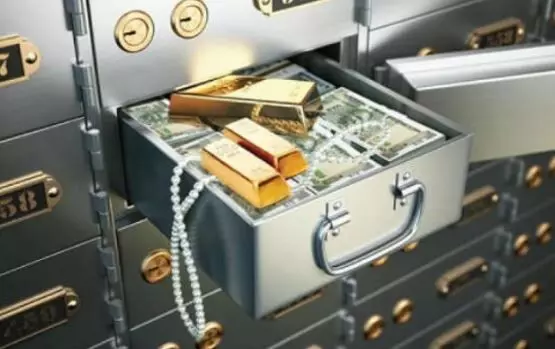How Safe Are Cash and Jewelry in a Bank Locker? The Surprising Truth about Liability
In India, a significant number of customers utilize bank lockers to safeguard their valuable assets, including gold, silver, and cash.
image for illustrative purpose

In India, a significant number of customers utilize bank lockers to safeguard their valuable assets, including gold, silver, and cash. These secure vaults, constructed with robust materials, are designed to protect these assets from various potential threats, including theft, fire, floods, and natural disasters. However, understanding the implications of such events and the guidelines established by Indian banks is crucial.
In the unfortunate event that your valuables stored in a bank locker are stolen or damaged due to circumstances like floods, earthquakes, riots, terrorist attacks, customer negligence, and more, the initial expectation might be for the bank to assume responsibility and compensate for the losses. However, this is not the case. According to the Reserve Bank of India (RBI), the banking institution is not liable for the contents of their lockers.
However, in incidents such as fire, theft, robbery, building collapse, or fraudulent activities involving bank employees, the bank's liability is limited to an amount equivalent to only 100 times the prevailing annual rent of the safe deposit locker. This compensation is notably low.
For example, if the annual locker rental fee is Rs 1,000, the bank will only compensate Rs 1 lakh, regardless of the value of the assets kept inside the locker.
Adhil Shetty, CEO of BankBazaar.com, explained, "While the bank is obligated to take reasonable precautions, it bears no liability in cases of damage or loss of locker contents due to natural disasters like earthquakes or floods. In other cases, such as fire, theft, dacoity, building collapse, etc., the bank assumes liability due to its own negligence. However, this liability is limited to an amount equivalent to one hundred times the current annual rent of the safe deposit locker."
This limitation is due to the fact that banks are not aware of the contents or value of the items stored in the locker, as customers are not required to disclose these details. As a result, determining an accurate value for compensation becomes nearly impossible.
Furthermore, the bank's agreement specifies that the customer who rents the locker "leases" the space for a specified period to store valuables of their choice. Therefore, the responsibility for the contents and their safety falls squarely on the lessee, not the lessor.
A key question arises: Can you store cash in a bank locker? In an effort to regulate the use of safe deposit lockers in banks, the RBI has introduced a new agreement that permits customers to use lockers exclusively for legitimate purposes, such as storing documents and jewelry. Specifically, customers are prohibited from using lockers to store any form of cash.
While keeping cash in a locker does not yield any interest, it also raises concerns regarding adequate compensation in the event the bank's liability is exceeded, resulting in a potential loss for the customer.
Shetty advises, "Technically, you can store cash in bank lockers. However, the presence of unexplained cash in a taxpayer's possession may trigger inquiries from the tax department, requiring the taxpayer to provide documentation explaining the source of the funds. It is much safer to deposit the money with the same bank where you have your locker. This allows you to securely store the money and earn interest."

